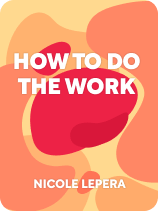

This article is an excerpt from the Shortform book guide to "How to Do the Work" by Nicole LePera. Shortform has the world's best summaries and analyses of books you should be reading.
Like this article? Sign up for a free trial here.
Why do people self-sabotage? How can you stop sabotaging yourself, according to psychology?
According to psychologist Nicole LePera, conforming to your parents’ expectations as a child caused you to lose touch with who you really are and your true needs. This makes it difficult for you to feel at peace with yourself and can lead to self-sabotage as an adult.
Keep reading to learn how to stop sabotaging yourself, according to LePera’s advice.
Why You Self-Sabotage
According to bestselling author and holistic psychologist Nicole LePera, you may be engaging in defensive childhood patterns that impact your ability to feel satisfied with yourself, your relationships, and your overall wellbeing. To stop sabotaging yourself, it’s important to work on replacing these patterns with healthier ones.
LePera argues that the most effective way to overcome defensive childhood patterns is to consciously address the childhood experiences that caused you pain. According to her, the reason your defensive patterns hold so much sway over you is that you’re still using them to avoid feeling your childhood pain. And, because you didn’t consciously feel and process these painful emotions, they continue to live within your subconscious mind and influence all your behaviors.
Therefore, she suggests that you revisit the childhood beliefs and experiences that instigated your defensive patterns, acknowledge how they impact your current patterns, and create new beliefs that support healthier patterns.
Strategy #1: Establish a Daily Routine
The first step toward creating healthier patterns and to stop sabotaging yourself involves establishing a daily routine to retrain your subconscious mind. According to LePera, committing to a daily ritual to consciously address defensive childhood patterns will improve your overall well-being and help you retrain your subconscious mind to adopt healthier, more positive patterns.
Though changing your beliefs and behaviors will create discomfort (Recall: your subconscious mind subverts attempts to change default patterns by creating mental and physical discomfort), LePera argues that this discomfort is a necessary part of overcoming defensive childhood patterns.
She claims that taking small steps each day to consciously address your beliefs and behaviors will provide two benefits:
1) Small daily changes will add up and eventually lessen your subconscious mind’s resistance to change.
(Shortform note: Rober Maurer (The Kaizen Way) confirms that small daily changes are more likely to bypass your subconscious mind’s resistance to change. Each time you introduce a new change, you’ll demonstrate to your subconscious mind that you are safe, and you’ll eventually train it to expect and adapt to these changes.)
2) Practicing daily conscious awareness will help you break free from the tendency to act on autopilot—thus, making it easier for you to choose your behaviors.
(Shortform note: Neuroscientists confirm that, while you can’t delete default patterns from your mind, practicing conscious awareness will help you weaken these patterns so that your brain no longer relies on them. The more you weaken these patterns, the easier you’ll find it to override them with new automatic patterns that align with your chosen behaviors.)
Strategy #2: Use Self-Care to End Self-Sabotage
Another way to stop sabotaging yourself is to try incorporating a self-care ritual into your daily routine. This will help you to better tolerate any discomfort. LePera suggests methods such as:
- Practicing mindfulness
- Using positive visualizations and affirmations
- Improving your diet
- Exercising regularly
- Sleeping well
| Each Positive Change Sets Into Motion a Series of Subsequent Positive Changes Scientific evidence confirms that each of LePera’s five methods offers a number of benefits that improve your mental and physical health: 1. Practicing mindfulness: Mental health practitioners confirm that practicing mindfulness increases self-awareness, encourages positive thoughts about yourself, your circumstances, and others, and improves your mental well-being. 2. Using positive visualizations and affirmations: Studies reveal that imagining a positive event impacts your brain in the same way that experiencing a positive event does—it creates pleasurable feelings that enhance your mood. Likewise, affirmations stimulate reward circuits in your brain that help you maintain a positive state of mind. 3. Improving your diet: Research indicates that in addition to improving your physical health, eating nutrient-dense foods regulates serotonin levels in your body. This in turn improves your mood, enhances your cognitive abilities, and increases your energy levels. 4. Exercising regularly: Neurobiology research shows that in addition to improving your physical health, regular exercise releases the neurochemicals GABA, serotonin, BDNF, and endocannabinoids. These chemicals help maintain a positive state of mind by stimulating cognition, regulating emotions, and enhancing self-esteem. 5. Sleeping well: Regular sleep promotes healthy brain chemistry by flushing out toxins that impair the flow of information between neurons. While you’re awake, your brain and body burn sources of energy such as oxygen and glucose. This process creates metabolic waste that accumulates in your system and leads to feelings of fatigue, stress, and irritability. Sleep allows your body to flush this waste out of your system and restore your energy sources—thus improving both your mental and physical health. |

———End of Preview———
Like what you just read? Read the rest of the world's best book summary and analysis of Nicole LePera's "How to Do the Work" at Shortform.
Here's what you'll find in our full How to Do the Work summary:
- How childhood conditioning impacts your mental and physical health
- How to develop positive patterns that improve your well-being
- Tools to feel happier, healthier, and more in control of your life






